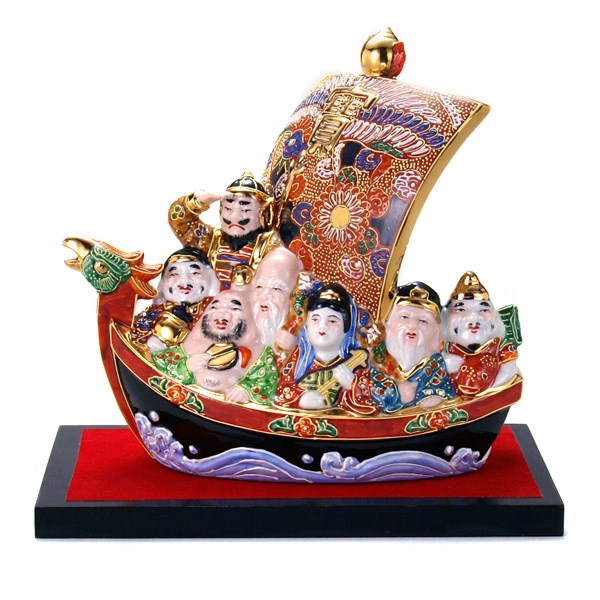|
|
|
|
|
|
No. 7 Seven Lucky Gods Treasure Ship, Decoration (w/Stand, Mat)
|
|
|
|
|
| Special Shipping Cost: |
Asia: |
JP¥ 1,650 |
|
North America/Oceania: |
JP¥ 2,250 |
|
Europe: |
JP¥ 2,500 |
|
Africa/South America: |
JP¥ 3,650 |
|
|
| Quantity |
|


 |
 |
|
This Kutani-yaki Seven Lucky Gods treasure ship is very popular as an auspicious item for one's first dream of the New Year. Can be given as a gift for those both in and out of Japan.
Around the middle of the Edo period, it was a popular custom to place a picture of a treasure ship under the pillow in order to have a good first dream of the New Year. At first it was a simple ship with just treasure, but then eventually became crowded as the Seven Lucky Gods made an appearance.
The Seven Lucky Gods are a mixture of gods from three countries - India, China and Japan. In Japan, from the late Heian period, people started to believe in them and it is said this originates from the Seven Sages of the Bamboo Grove and the Buddhist phrase that translates as "seven adversities disappeared and seven fortunes arose". In general, these seven gods, from left to right - Ebisu, Daikokuten, Benzaiten, Bishamonten, Hoteison, Jurojin, Fukurokuju - are called the Seven Lucky Gods.
[Ebisu] A Japanese god based on ancient Shintoism. (A lucky god that brings business prosperity, a good catch/harvest.)
[Daikokuten] A Hindu god from India. (God of a bumper crop and wealth & happiness.)
[Benzaiten] The only female deity that is the god of Indian rivers and waters. (God of music, speech, fortune, wisdom and long life)
[Bishamonten] One of the Four Heavenly Kings that protects Buddhist teachings. A Hindu god from India who is protector of the north. (God of warding off evil and wealth of riches.)
[Hoteison] A Buddhist Zen monk who actually existed in Míngzhōu (China) at the time of the late Tang Dynasty - Later Liang Dynasty. (God of a peaceful home and prosperity & happiness)
[Jurojin] A Chinese Taoist god. A symbol of harmony between longevity and nature that is the incarnation of the "Old Man of the South Pole" star, Canopus. (God of prosperity & happiness, wealth and longevity)
[Fukurokuju] A Chinese Taoist god. Possesses the virtues of happiness, remuneration and longevity, and is said to be the same body as Jurojin yet goes under a different name. (God of economic fortune and longevity.)
This Kutani-yaki ornament is created using gorgeous colorful colors such as the Kutani five colors, gold, silver, etc., together with advanced painting techniques, enhancing the value of this good luck charm. Whether used as an ornament, or given as a gift or souvenir, this is sure to cause great pleasure.
A feature of this Kutani-yaki ornament (made of porcelain) is that it can be enjoyed for many years. Unlike tableware, there is hardly any deterioration due to usage. If you take care of it properly, it can beautifully decorate a room for a long time.
Thanks to this, this is perfect for a variety of purposes such as as a celebration gift for opening a store, a wedding, starting a business, giving birth, a housewarming, or as a thank you gift.
|
●Materials: porcelain, [Stand] MDF, [Mat] carpet
●Size (approx.): Length 22cm x Width 15cm x Height 21cm
●Weight (item only): approx. 1000g
●Weight (including packaging material): approx. 1910g
●Made in Ishikawa Prefecture
●Brand Name: Kutani-yaki
[Handling Precautions]
*Decorative plates, ornaments, porcelain tiles etc: In places with bad stability, safely take proper care when setting and take measures to prevent falling.
*When storing, lightly wipe dry with a soft cloth to remove dirt and carefully store, especially for ornaments that use gold and silver.
*The bases of Kutani ware items are not coated with glaze. Minimal polishing has been performed but scratches may occur in places that come into direct contact with it. Take care when using on soft or easily damaged surfaces such as alcoves ("Toko-no-ma"), flower tables, shelves, tables and lacquer-finished surfaces, and be sure to lay something underneath.
*Vases, decorative plates, ornaments, porcelain tiles and other decorative items: In respects to aesthetics, finely colored decorative paint may be used. Refrain from using as tableware.
*For vases, especially ceramics (pottery): Should sealing treatment be insufficient, water may ooze out on rare occasions. Should water leaking occur, please contact the customer center.
*Using abrasive sponges, nylon or metallic scourers, cleansers etc may cause the gold, silver, paint or adhesive to peel off and damage the surface, so refrain from using.
*Do not use for anything other than its intended purpose.
[Other]
*As each item is hand-made one-by-one, the color, pattern & shape may differ slightly from the photos.
*Should there be no stock, item manufacture will take place after order placement. Depending on the item, delivery may be delayed. Please contact customer service regarding the delivery date.
|
|
|
Measurements(please note there will be slight difference)

|

No. 7 Seven Lucky Gods Treasure Ship, Decoration (w/Stand, Mat)
|
|
 |
 |
 |
 |
|
|
|
No. 3 Maneki Neko, White
|
|
JP¥ 5,500
|
US$ 43.88
|
 |
 |
 |
 |
 |
|
|
|
No. 1.5 Owl Pair, Yellow
|
|
JP¥ 3,500
|
US$ 27.92
|
 |
 |
 |
 |
 |
|
|
|
No. 5 Sideways Maneki Neko, Long-Haired Calico (w/Futon)
|
|
JP¥ 9,000
|
US$ 71.80
|
 |
 |
 |
 |
 |
|
|
|
Mug, Sometsuke Onagadori
|
|
JP¥ 3,000
|
US$ 23.93
|
 |
 |
 |
 |
 |
|
|
|
No. 3 Hina Doll, Green (Stand, Mat, Folding Screen, Wooden Tag)
|
|
JP¥ 15,000
|
US$ 119.67
|
 |
|
|
|
|